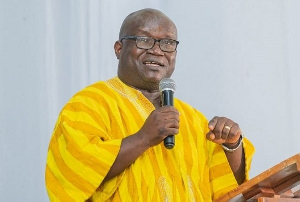The Chief Executive Officer of the Ghana Chamber of Mines (GCM), Dr Kenneth Ashigbey, has proposed that the government initiate investments in prospecting and exploration to secure a larger share of the nation’s mineral resources.
He said if the government desired greater equity in the mineral extraction industry, it must be involved from the start of the value chain, beginning with prospecting and exploration.
Dr Ashigbey made the suggestion at a news conference in Accra last Thursday to highlight the contribution of GCM member companies to government revenue in 2024.
His remarks followed a question on how Ghana could increase the benefits it derives from its mineral resources.
“If government wants more equity, it must invest early. You can’t come in after someone has spent 10 years exploring and expect a large share without putting money in,” he stated.
He welcomed the recent lithium agreement in which the government secured an equity stake.
“The equity is available, but we must invest to take it up. Parliament is expected to ratify the lease when it resumes, and if that happens, government should ensure it secures the equity,” he said.
Dr Ashigbey disclosed that most exploratory licences are currently held by Ghanaians and called for support to help those licence holders progress into actual exploration and, eventually, production.
“That’s where the heavy lifting is. Someone can invest $60 million and still come up with nothing, so we need to support them through this risky but vital phase,” he explained.
The GCM CEO stressed that the country must be willing to sacrifice if it wants more from its natural resources.
“We must be willing to reinvest a portion of today’s mineral revenues into prospecting and exploration for the sake of future ownership and control,” he stated.
On revenue management, Dr Ashigbey called for the establishment of a Minerals Revenue Management Act, similar to the existing Petroleum Revenue Management Act.
Such a law, he said, would ensure that portions of mineral income are allocated to clearly defined development projects, rather than being spent on recurrent expenditure.



